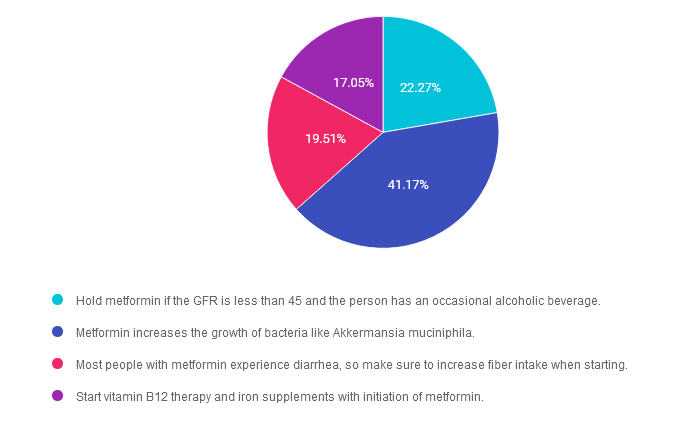For last week’s practice question, we quizzed participants on a person’s concerns about metformin use & potential side effects. 41% of respondents chose the best answer. We want to clarify and share this important information, so you can pass it on to people living with diabetes and your colleagues, plus prepare for exam success!
Before we start though, if you don’t want any spoilers and haven’t tried the question yet, you can answer it below: Answer Question

Question: LS is reluctant to start on metformin because they heard it can cause diarrhea and kidney problems. You reassure LS that metformin doesn’t harm the kidneys and can actually improve gut health.
Based on the most recent evidence, which of the following is true?
Answer Choices:
- Hold metformin if the GFR is less than 45 and the person has an occasional alcoholic beverage.
- Metformin increases the growth of bacteria like Akkermansia muciniphila.
- Most people with metformin experience diarrhea, so make sure to increase fiber intake when starting.
- Start vitamin B12 therapy and iron supplements with initiation of metformin.

Getting to the Best Answer
Answer 1 is incorrect. 22.27% chose this answer. “Hold metformin if the GFR is less than 45 and the person has an occasional alcoholic beverage.” The guidelines state not to start metformin is the GFR is less than 45. But if someone is already on metformin their GFR drops below 45 we can continue it with caution and we might reduce the dose. We stop metformin if the GFR is less than 30. We don’t recommend metformin if someone is binge drinking due to the potential risk of lactic acidosis. An “occasional drink” would not reach the threshold to stop the metformin. Download Med PocketCards for more info.
Answer 2 is correct. 41.17% of you chose this answer. “Metformin increases the growth of bacteria like Akkermansia muciniphila.” Yes, this is the best answer. Metformin has been shown to increase gut bacterial diversity with a special nod to one of our favorite mucus protective bacteria known as “Akk”. This beneficial bacteria increase levels of butyrate and protects intestinal mucous lining, which helps to decrease inflammation. Cheers for AKK! Download Med PocketCards for more info.
Answer 3 is incorrect. About 19.51% of respondents chose this. “Most people with metformin experience diarrhea, so make sure to increase fiber intake when starting.” This is not accurate, since only a small percentage of people experience diarrhea. And, if they do, switching them to metformin extended release can decrease intestinal discomfort. Download Med PocketCards for more info.
Finally, Answer 4 is incorrect. 17.05% chose this answer. “Start vitamin B12 therapy and iron supplements with initiation of metformin.” Some, but not all individuals experience B12 deficiency on long term metformin therapy. We would only start B12 replacement therapy after confirming low B12 levels. Download Med PocketCards for more info.
We hope you appreciate this week’s rationale! Thank you so much for taking the time to answer our Question of the Week and participate in this fun learning activity!
Check out these upcoming class offerings!
All hours earned count toward your CDCES Accreditation Information
Sign up for Diabetes Blog Bytes – we post weekly Blog Bytes that are informative and FREE! Every week we post one exam practice Question of the Week and Rationale of the Week. Sign up below!
The use of DES products does not guarantee the successful passage of the certification exam. CBDCE and ADCES do not endorse any preparatory or review materials for the CDCES or BC-ADM exams, except for those published by CBDCE & ADCES.













